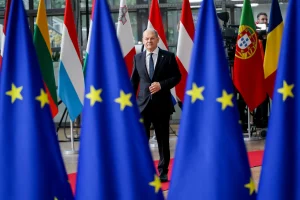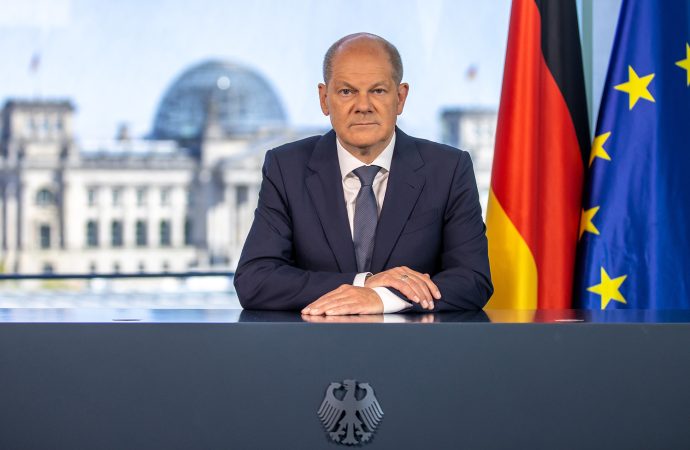Introduction Tensions are rising within the European Union as trust among member states takes a hit, fueled by recent policy U-turns from Berlin. Political analyst Dr. Sophia Müller dissects the reasons behind the shifts, their impact on diplomatic relationships, and the potential challenges for maintaining unity within the EU. Berlin’s Policy Reversals Recent policy reversals
Introduction
Tensions are rising within the European Union as trust among member states takes a hit, fueled by recent policy U-turns from Berlin. Political analyst Dr. Sophia Müller dissects the reasons behind the shifts, their impact on diplomatic relationships, and the potential challenges for maintaining unity within the EU.
Berlin’s Policy Reversals
Recent policy reversals by Berlin have left EU partners uneasy, sparking concerns about the reliability of Germany as a diplomatic ally. Dr. Müller breaks down the key instances of policy U-turns and the reactions from EU member states.
Notable Policy Reversals

This image is taken from google.com
- Economic Measures: Berlin’s changes in economic policies, including shifts in fiscal approaches and trade stances, have raised eyebrows among EU partners relying on stable economic cooperation.
- Security and Defense: The reevaluation of Berlin’s commitments to certain security and defense initiatives has led to uncertainty among EU member states relying on collective security measures.
- Migration and Asylum: Alterations in Germany’s approach to migration and asylum policies have triggered concerns among EU partners, impacting the collaborative efforts to address migration challenges.
Reasons Behind the U-Turns
Dr. Müller analyzes the factors contributing to Berlin’s policy reversals, offering insights into the internal and external dynamics shaping these changes.
Factors Influencing Policy Shifts
- Domestic Pressures: Internal political dynamics and public sentiment have played a role in shaping Berlin’s policy decisions, with leaders responding to evolving priorities at home.
- Coalition Politics: Changes in coalition dynamics and power-sharing agreements within Germany have influenced policy directions, leading to adjustments in the country’s approach on the European stage.
- Global Geo-Political Shifts: External factors, such as evolving global geopolitical landscapes, have prompted Germany to reevaluate its positions, aligning policies with emerging international challenges.
Impact on Diplomatic Relationships

This image is taken from google.com
Dr. Müller examines the repercussions of Berlin’s policy U-turns on diplomatic ties within the European Union, considering how trust deficits may affect collaborative efforts.
Diplomatic Strain
- Erosion of Trust: EU partners express concerns about the erosion of trust, as shifts in Germany’s policies create uncertainty about the country’s reliability as a diplomatic ally.
- Collaborative Challenges: The strained relationships may impede collaborative efforts on key EU initiatives, hindering progress on economic, security, and migration fronts.
- Potential Fragmentation: Continued distrust among EU partners could contribute to potential fragmentation within the union, challenging the cohesion that is crucial for addressing shared challenges.
Navigating the Path Forward
As EU partners grapple with trust issues stemming from Berlin’s policy U-turns, Dr. Müller provides insights into potential strategies to rebuild diplomatic relationships and maintain unity within the European Union.
Strategies for Rebuilding Trust
- Transparent Communication: Open and transparent communication from Berlin about the rationale behind policy changes can contribute to rebuilding trust and understanding among EU partners.
- Diplomatic Engagement: Increased diplomatic engagement, including bilateral discussions and multilateral forums, can help address concerns and foster a sense of collaboration among member states.
- Commitment to Common Goals: Reaffirming commitment to common EU goals and values can serve as a foundation for rebuilding trust and strengthening unity within the union.
Conclusion
As trust erodes among EU partners in the wake of Berlin’s policy U-turns, the European Union faces a critical juncture in maintaining unity and collaboration. Dr. Sophia Müller’s analysis provides valuable insights into the reasons behind the shifts, the impact on diplomatic relationships, and potential strategies for navigating the path forward. The coming months will be crucial in determining whether trust can be rebuilt and whether the EU can overcome the challenges posed by these recent policy reversals.
















